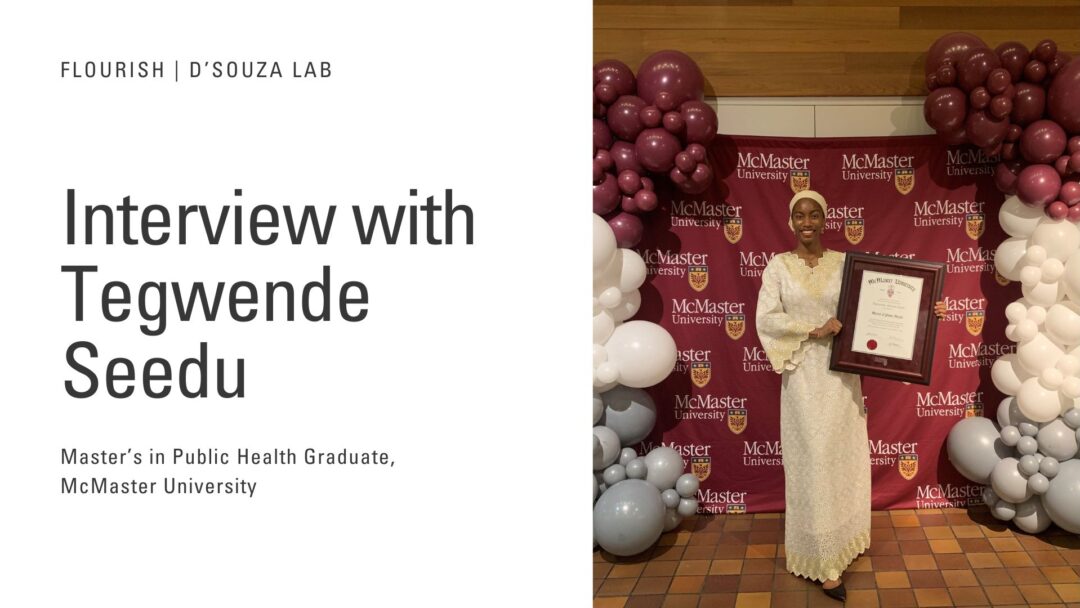Interview with Master’s in Public Health Graduate, Tegwende Seedu

Tegwende Seedu completed her Bachelor of Science at the University of Toronto and recently graduated with a Master’s in Public Health from McMaster University. In the interview below, Tegwende shares some memorable experiences from her Master’s degree and discusses the importance of centering patient perspectives in pregnancy and postpartum research and care.
Tell us about your research.
My thesis focused on maternal morbidity – or adverse events related to pregnancy, childbirth and the postpartum period – specifically from the perspectives of women and people with pregnancy experience (WPPE). The goal of my thesis was to better understand what maternal morbidity means to WPPE, as this can help us expand research and care to meet patients’ needs.
What method(s) did you use to conduct your research?
I used concept analysis to conduct my research. I reviewed literature focused on maternal morbidity from the perspectives of WPPE and used a data extraction form to identify concept-related data from these studies, which I then analyzed for common themes.
I chose concept analysis because it allowed me to not only look at maternal morbidity itself, but also the events that lead up to maternal morbidity – or antecedents – as well as the events that result from it – or consequences. This helped create a fuller picture of WPPE’s experiences with maternal morbidity.
What were some of the major findings of your study?
Some of the common antecedents that I identified were lack of access to care, financial stress and being labelled a high-risk pregnancy. It’s important that we find opportunities to address these antecedents with community-based care – alongside clinical care – to help patients build resilience and prevent or reduce the impact of maternal morbidity, when possible.
Some common consequences of maternal morbidity were changed body functioning and impacted relationships with partners. Many patients noted that maternal morbidity isn’t always a short-lived event but can have longer-lasting effects on their lives.
I also identified protective factors that appeared throughout the studies, such as having good social and financial support and having faith, which helped individuals feel like they weren’t shouldering the burden of getting through their experience alone. These protective factors promoted individuals’ resilience and enabled them to better navigate their experiences and recover from them.
By acknowledging that patients’ experiences of maternal morbidity aren’t informed solely by the events themselves, but also by the event antecedents and consequences, we can find more opportunities to support WPPE throughout their pregnancy, childbirth and postpartum experiences.
Tell us about some memorable experiences or achievements from your Master’s degree.
I got to take the San’yas Indigenous Cultural Safety Training as part of one of my courses. The training helps researchers identify approaches to conducting Indigenous research as an outsider, keeping in mind the full context of Indigenous communities’ culture and history in Canada. This course was a great proactive step to take ahead of any opportunities to participate in Indigenous-related research that may arise in the future and was beneficial in considering my general approach to research concerning populations with identities different from my own.
In May, I got to present my research poster at our department research day. I really enjoyed sharing my research with peers and meeting new colleagues from across McMaster. That kind of informational exchange was really memorable for me.
A few weeks after that, I found out that I was selected for the Faculty of Health Sciences’ Outstanding Achievement Award for Professional and Research Excellence. The recognition was encouraging as I continued my studies.
Why did you choose to study at McMaster?
I did my undergraduate degree elsewhere, so being part of the McMaster community was itself a memorable part of my Master’s experience.
Part of the reason why I chose to study at McMaster was because the University’s Public Health program takes a generalist approach, rather than specifically focusing on one field. I learned a lot in my first year about topics such as population and public health policy, epidemiology and research methods. I enjoyed developing this knowledge throughout my thesis and in a part-time practicum I did with Dr. D’Souza
I’ve really enjoyed being part of the student body at McMaster. I received the Black Student Success Centre’s Catalyst for Change Award at this year’s Black graduation ceremony for my leadership across campus – which included being part of the Black Student Mentorship Program, speaking at the Black Aspiring Physicians of McMaster Association and leading a book club with the Student Wellness Centre called the Diaspora’s Digest.
What kinds of skills did you gain during your degree?
Communication is a soft skill that I really developed during my degree, through course discussions, presentations, D’Souza Lab meetings, and working with my mentor and Associate Member, Rebecca Seymour. I got to improve my skills in communicating my research to various audiences, including fellow researchers and students, as well as the non-research population – which is especially important because my research centres patients’ perspectives.
“Tegwende was a pleasure to work with and I was honored to be an associate member of her committee. The research she completed is incredibly important and will help improve people’s experiences of pregnancy, birth and the postpartum period.”
Rebecca Seymour
Postdoctoral Fellow
What advice would you give to incoming graduate students?
Be proactive about asking for help. Your faculty and mentors are there to support you; there’s no need to struggle before you ask for assistance. Plus, asking for help may give you more opportunities to grow and network.
What are you planning next for your studies and/or career?
My goal in pursuing my Master’s in Public Health was to develop expertise that will help me support communities as a physician. I’m applying to medical school and hoping to combine the knowledge and skills that I’ve gained here to serve communities and individuals to the best of my ability.
News